|
|
|
Sort Order |
|
|
|
Items / Page
|
|
|
|
|
|
|
| Srl | Item |
| 1 |
ID:
079898
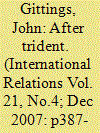

|
|
|
|
|
| Publication |
2007.
|
| Summary/Abstract |
The British government decision on `Trident renewal' forms part of a much wider rebuff to the non-proliferation and peace agenda. The Nuclear Non-Proliferation Treaty risks being discredited at its next review in 2010; new nuclear powers are setting the pace for others; another `war' is being threatened which will last `for generations'. There has been no post-Cold War peace dividend, and the chance to make up for lost time has been missed. War, not peace, is once again seen as the universal default mode.
It is now clear that traditional arguments in favour of peace and nuclear disarmament are never going to succeed. The view that one `cannot predict the unpredictable', used to justify the Trident decision, will always result in decisions being reached on a worst-case scenario. New arguments need to be developed with a broader appeal based not only on strategic calculation but on a compelling alternative world view.
Looking both forward and back into history we have to rediscover peace, not war, as humanity's central concern. Just as the test of the good ruler in ancient China was to maintain peace within the four corners of the kingdom, so today modern states have a shared obligation to exercise good governance across the globe. The effort to reshape our common goals will require a sustained exercise in the re-education of elites, and the mobilisation of multitudes
|
|
|
|
|
|
|
|
|
|
|
|
|
|
|
|
| 2 |
ID:
144291
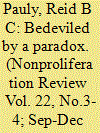

|
|
|
|
|
| Summary/Abstract |
This article explores how two influential American policy makers—Paul Nitze and McGeorge Bundy—wrestled with the idea of a norm against the use of nuclear weapons. Existing scholarship has overlooked how both Bundy and Nitze came to understand the idea of nuclear non-use, especially related to the credibility of threats to use nuclear weapons. Using documentary evidence from their personal papers, this article illuminates the thinking of Bundy and Nitze, finding that both engaged with the idea of a norm of non-use of nuclear weapons in their strategic writing and thought.
|
|
|
|
|
|
|
|
|
|
|
|
|
|
|
|
| 3 |
ID:
151398
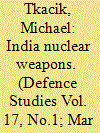

|
|
|
|
|
| Summary/Abstract |
This article argues India is laying the foundation to move away from “no-first-use” (NFU) as its nuclear weapons employment policy. Since the inception of its nuclear weapons program, India has claimed NFU as the centerpiece of its nuclear strategy. But India has a history of developing foundational changes to its nuclear weapons program before such changes actually occur. For example, the infrastructure of India’s nuclear weapons program was already being created in the 1950s under the guise of civilian nuclear power. Similarly, the weaponization of India’s program, which did not officially occur until after the 1998 tests, had its genesis in far earlier decisions. A close examination of trends in India’s nuclear weapons production complex, its delivery systems, and its command and control complex all lead to the conclusion that India is laying the groundwork for more flexible employment options, up to and including first use. This article does not argue such a decision has been taken. Rather, it argues the underpinning is in place to allow for a move to more flexible options, perhaps very quickly, at some point in the future. This could occur during crisis or it could occur incrementally over time.
|
|
|
|
|
|
|
|
|
|
|
|
|
|
|
|
| 4 |
ID:
184119
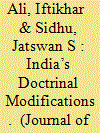

|
|
|
|
|
| Summary/Abstract |
This paper assists in understanding contesting technological capabilities and doctrinal modification between India and Pakistan that are drifting South Asia towards instability, leaving the nuclear deterrence in a dark abyss. Hawks on both sides of the nuclear armed rivals are unprecedentedly chanting threats of nuclear war. More bothersome is the indications of shifting the Indian policy of No First Use (NFU), calls for doctrinal modifications and counterforce temptations. An Indian quest for escalation dominance and Pakistani quest for stability against India is in fact a mutual struggle beyond ‘minimum credible’ to ‘assured second strike’ capabilities.
|
|
|
|
|
|
|
|
|
|
|
|
|
|
|
|
| 5 |
ID:
157826
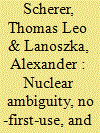

|
|
|
|
|
| Summary/Abstract |
The United States has long embraced calculated ambiguity over the conditions under which it might use nuclear weapons against adversaries, a trend that President Donald J. Trump has continued. This ambiguity could unsettle some observers, especially those who believe that the United States should declare a no-first-use (NFU) policy such that it would not be the first state to introduce nuclear weapons in either a crisis or an armed conflict. NFU advocates identify three potential pathways whereby a more ambiguous posture can lead to increased danger: downward spiral, accidental war, and use-it-or-lose-it. For evidence, they invoke Saddam Hussein’s risk-accepting decision to pre-delegate chemical-weapons use following US nuclear threats in the 1991 Gulf War. In analyzing the reasoning and evidence of these arguments, we argue that the alleged benefits of NFU may be overstated, at least for crisis stability in asymmetric crises, defined by one side’s overwhelming conventional military superiority. Each of the three foregoing pathways is logically inconsistent and the empirical case is misinterpreted. Nuclear ambiguity may not be so dangerous as NFU advocates claim.
|
|
|
|
|
|
|
|
|
|
|
|
|
|
|
|
|
|
|
|
|